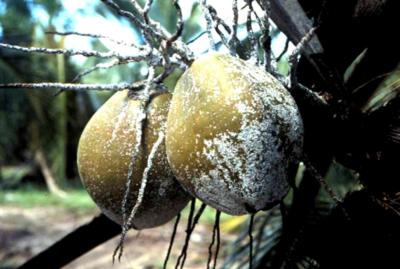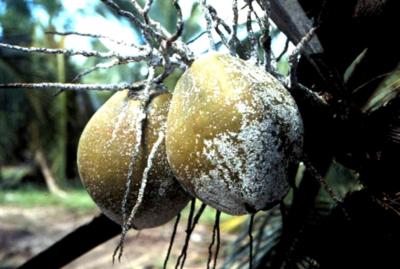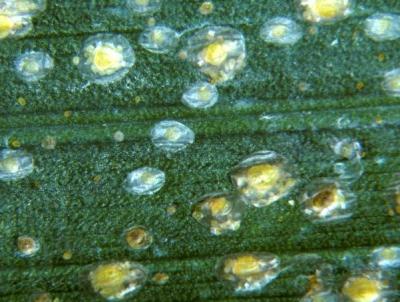


Coconut scale (Aspidiotus destructor)
A number of scales feed on leaves and fruits of coconut palms. The most damaging is the coconut scale (Aspidiotus destructor). This scale is bright yellow and round (females) or reddish and oval (males) covered with a semitransparent greyish white flat scale. The scale diameter is 1.5 to 2.0 mm. Females are always wingless and remain under their scale their entire life. Adult males have one pair of membranous wings, move about actively in search of females and do not feed during the adult stage. Eggs are protected underneath the scale or shell of the mother insect until they hatch. Upon hatching the young scales leave the maternal scale, take up a position and start feeding. They do not move afterwards. They are found mainly on the undersides of the leaves, but frond stalks, flower clusters and young nuts can also be attacked.
A severe infestation of this armoured scale forms a continuous crust over flower spikes, young nuts and the lower surface of leaves. The leaves become yellow and eventually die. The crown dies leading to collapse of the infested plant. Attacks of young nuts cause shrivelling of nuts leading to premature nut falls. Mostly young coconut trees of up to 10-15 years are vulnerable to damage.
Scales may infest palms throughout the year, but damage is usually more severe during the dry season. Neglected plantations are particularly susceptible.
The coconut scale also attacks many species of fruit trees, such as avocado, breadfruit, mango, guava and papaya. Other major hosts are cocoa, cassava, cotton, oil palm, papaya, rubber, sugarcane and tea. It also attacks a range of ornamental plants including roses.
- Conserve natural enemies. They usually keep scales under control. Ladybird beetles and parasitic wasps are particularly effective in controlling the coconut scale
- Avoid or restrict movement of infested plants in areas where the coconut scale is not a problem, to avoid spread of the scale.
- Destroy infested plants and plant parts. This may help to eradicated scales from new areas. However, this scale is difficult to eradicate due to its wide host range.
- Provide good growing conditions for the palms. Healthy palms in well-drained soils are seldom seriously infested.
